7 conclusions from the elite women's 2020 UCI World Championships
History made in Imola, injured Van Vleuten still an asset, Longo Borghini upsets Dutch sweep, breakaway failure, and more
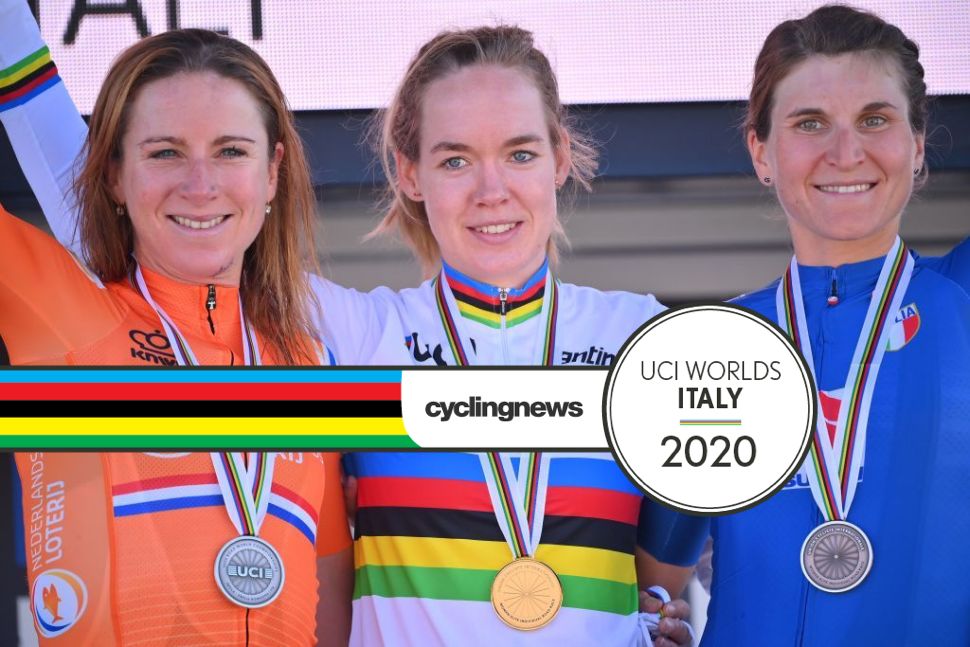
The elite women's events at the 2020 UCI Road World Championships wrapped up on Saturday with the road race won by Anna van der Breggen (Netherlands), who continued the Dutch dominance on the world stage for a fourth year in a row.
The women's 143km road race included five laps of a 28km circuit that started and finished at the Autodromo Internazionale Enzo e Dino Ferrari in Imola, and featured two steep climbs on each circuit – the Mazzolano and the Cima Gallisterna – and a total of 2,800 metres of climbing.
The race played out as expected, and with history repeating itself, with a Dutch rider taking a solo victory. It's a strategy that has seen the nation win the world title in 2017 with Chantal van den Broek-Blaak, in 2018 with Anna van der Breggen, in 2019 with Annemiek van Vleuten, and again with Van der Breggen in Imola.
Cyclingnews highlights seven conclusions from the elite women's road race.
Van der Breggen makes history in Imola
Anna van der Breggen made history at the 2020 UCI Road World Championships as the first rider in a quarter of a century to win double world titles in the elite women's time trial and the road race in the same year. Van der Breggen secured the time trial world title on Thursday and went on to claim a solo victory in the road race on Saturday.
The only other woman to accomplish such a feat was Jeannie Longo from France, who won both the time trial and road race titles in Duitama, Colombia, in 1995.
Van der Breggen has had a run of winning performances during the revised calendar, with victories at the Dutch national championships, the European Championships, the overall title at the Giro Rosa, and her two world titles in Imola this week.
Get The Leadout Newsletter
The latest race content, interviews, features, reviews and expert buying guides, direct to your inbox!
There's likely to be more success to come for her as the revised calendar continues with Flèche Wallonne on Wednesday, when she lines up to attempt a sixth consecutive victory.
Van der Breggen will wear her double rainbow jerseys all of next year, which will be her last season before she retires and becomes a sports director for SD Worx – the new 2021 sponsor of her current Boels Dolmans team.
Injured Van Vleuten still in the medals
Even an injured Van Vleuten is a contender for the rainbow jersey, and she proved as much after securing the silver medal in Imola, while her teammate Van der Breggen won the world title from a solo breakaway.
Van Vleuten thought her season was over after she crashed and fractured her wrist during stage 7 at the Giro Rosa. However, after successful surgery, careful consideration and discussion with the Dutch federation's medical team, she was granted permission to start the road race.
It's not the first time Van Vleuten has raced to success with an injury. In the 2018 season, she crashed and dislocated her shoulder during the Tour of Flanders and sprinted to third. That same year, she broke her knee in a crash at the World Championships, but continued racing for 90km and placed seventh, while helping Van der Breggen to win the world title.
Her compatriot Marianne Vos summed it up when she spoke of her injured teammate in an interview after the elite women's road race in Imola: "With her, the team is stronger, so we were happy to have her here."
Longo Borghini upsets a Dutch podium sweep
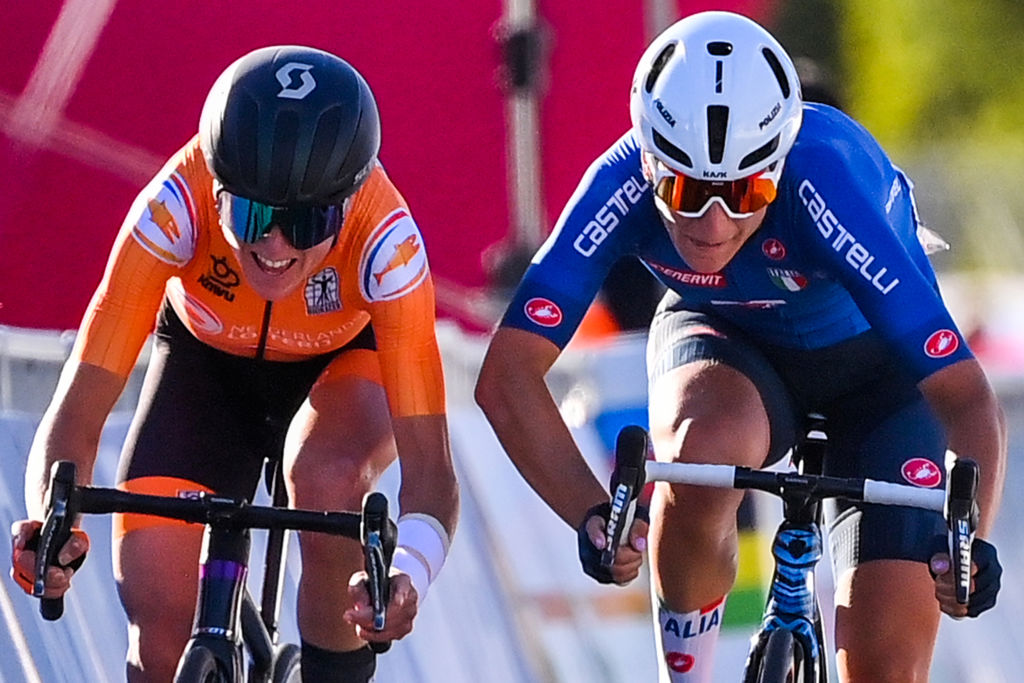
Elisa Longo Borghini may not have ended her nation's rainbow-jersey drought in the elite women's road race on home soil, but she stopped the Dutch from taking a complete podium sweep.
The Italian was a favourite coming into the race, and even if it was a long-shot to beat the powerful eight-strong Dutch team, she was still among them, finishing in third place behind winner Anna van der Breggen, silver medallist Annemiek van Vleuten, and ahead of fourth-placed Marianne Vos.
Longo Borghini said she was proud to fly the Italian flag on the podium, particularly after her nation's tough battle with the COVID-19 pandemic in the spring, and then pulling through to organise the World Championships in September after they were cancelled in Switzerland.
For Longo Borghini, the bronze medal felt like a victory.
"This bronze medal means so much for me, especially thinking about how Italy was considered back in March," she said. "We were seen as the virus spreaders of Europe, but now we're seen as an example in the fight against the pandemic."
210km of Dutch breakaways
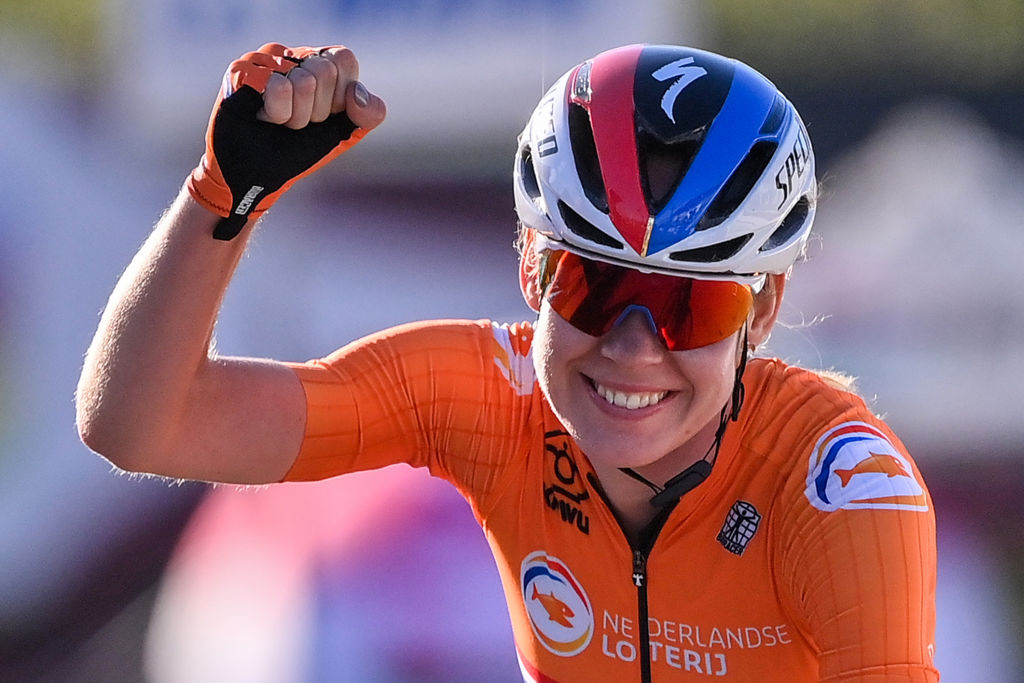
210. That's the total number of kilometres Dutch riders have spent off the front of the women's elite races during their solo winning moves in the last four years at the Worlds road race. For context, they raced less than 150km on Saturday. Annemiek van Vleuten is the obviously outlier with an unbelievable 106km solo break last year, but as a collective, the Dutch team are in a different league to the rest of the peloton. It must be frustrating for the competition who line up with fresh hopes each year, only to be trampled on in such dramatic fashion.
When the winning move came this time around, Vos – a multiple world champion herself – laid the ground work before Annemiek van Vleuten softened up what was left of the field, despite racing with a broken wrist. When Van der Breggen went solo, it almost looked as though relief had washed over the rest of the bunch. There was a valiant fightback from those that still had matches to burn, but once again it was the team in orange that controlled the race at almost every turn, coming just one position away from a clean sweep of the podium.
Perhaps the fight for silver would have been different if Great Britain's Lizzie Deignan had been able to hang on just that little bit longer, but even then there was no stopping Van der Breggen, and the Dutch steamroller goes on.
Dutch riders' solo kilometres en route to Worlds road race victory:
Anna van der Breggen: 41km in 2020
Annemiek van Vleuten: 106km in 2019
Anna van der Breggen: 40km in 2018
Chantal van den Broek-Blaak: 23km in 2017
Did the break fail to make the most of their chance?
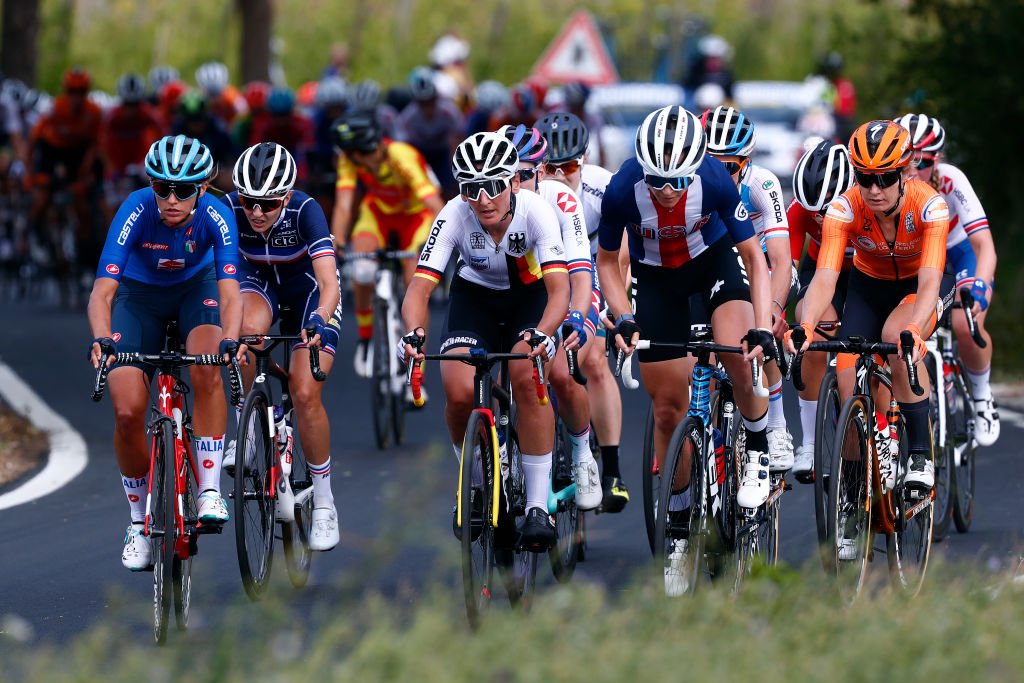
The only time the Dutch looked in any way vulnerable during the race was when a move of a dozen riders broke clear and established a lead of roughly 90 seconds. Alison Jackson (Canada) attacked first and was joined by Grace Brown (Australia) before Juliette Labous (France), Lisa Brennauer (Germany), Katia Ragusa (Italy), Tayler Wiles (USA), Alice Barnes (Great Britain), Hannah Barnes (Great Britain), Amy Pieters (Netherlands), Susanne Andersen (Norway) and Christine Majerus (Luxembourg) made contact.
There was still a long way to race, but with only Pieters in the move for the Dutch, the favourites lacked one of their familiar strengths: numbers. The break was by no means made up of major pre-race favourites, and it would have been a huge gamble, but had team orders dictated full-on commitment – and there was a coherent effort at times – then the Dutch would have perhaps have been forced to set a concentrated chase effort a lot earlier. In the end, they had enough firepower in reserve, so a committed break may have only delayed the inevitable, but for a brief moment the team in orange was in a position of slight vulnerability.
USA and Australia find it hard to adapt without their leaders
Both camps deserve credit and sympathy in equal measure. Australia lost their best medal hope in Amanda Spratt on the eve of the championships due to concussion, while the United States saw Chloe Dygert crash out of the time trial in horrific fashion on Thursday. Whether or not the riders in the stars and stripes even paid attention to former pro Rochelle Gilmore's deeply insensitive tweet hours after Dygert's crash remains unclear, but both teams at least came up with alternative tactics despite missing their two main candidates.
Australia replaced Spratt with Tiffany Cromwell, and they looked to make the race hard in the opening laps, sending riders up the road. Grace Brown latched onto a move from Canada's Alison Jackson, and when the Australian began to falter, her team put the hammer down and led an important chase. The USA had Tayler Wiles in the main break of the day, and the climber was one of the few riders to really commit to the move when it quickly established a lead. The move itself only came after the USA took control of the race and accelerated the pace.
When the Dutch decimated the field with 45km to go, first through Vos, and then with Van Vleuten and Van der Breggen, there was little either Australia or the USA could do, and eventually Lauren Stephens (11th) and Lucy Kennedy (28th) crossed the line in the main field. This was Australia's worst result in this race since 2001, and while the riders will undoubtedly face questions back home, some credit should be given to them due to the late loss of their leader and for the fact that they at least played their hand.
Deignan close, but not close enough
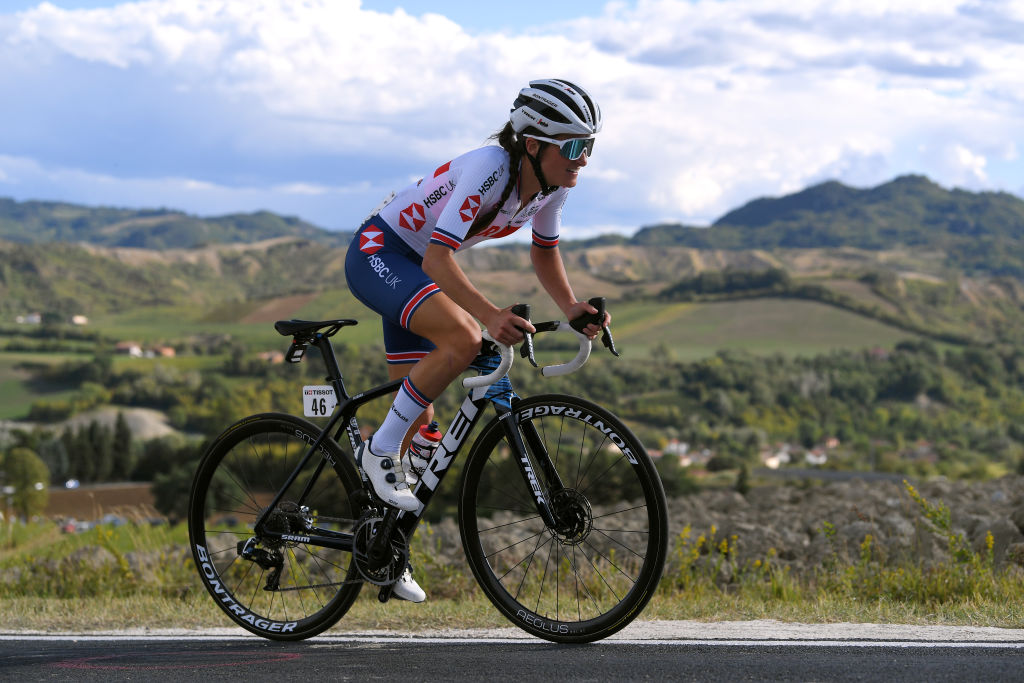
If Great Britain's Lizzie Deignan could have stuck with the Dutch riders over the climbs, she would have easily been the fastest sprinter and a contender for a medal. She almost did, several times over the steep climbs.
Van der Breggen's first attack was over the Mazzolano, with 50km to go, reducing the main field to just the strongest 30 riders in the race, and Deignan was one of them.
The Dutchwoman's second and more searing attack on the Cima Gallisterna with 41km to go was the winning move, and although Deignan was initially distanced by chasers Annemiek van Vleuten, Elisa Longo Borghini and Cecilie Uttrup Ludwig, she powered down the descent and caught back up to once again be in contention for the medals.
Van der Breggen raced into the final lap with a 1:23 gap, while Deignan, Uttrup Ludwig, Longo Borghini and Van Vleuten formed a strong chase group. However, they were caught, and the race for the silver medal was reset.
On the last climb over the Cima Gallisterna, Van Vleuten and Longo Borghini distanced themselves from the reduced main field, and although Deignan was close behind, she was not quite close enough, and the medal finishers raced up the road.
Deignan formed part of the small chase group that sprinted in for fourth place with Marianne Vos, Liane Lippert and Kasia Niewiadoma. It was an effort that shows how strong Deignan is on the climbs, particularly as she approaches the next part of the season – the Classics.
Daniel Benson was the Editor in Chief at Cyclingnews.com between 2008 and 2022. Based in the UK, he joined the Cyclingnews team in 2008 as the site's first UK-based Managing Editor. In that time, he reported on over a dozen editions of the Tour de France, several World Championships, the Tour Down Under, Spring Classics, and the London 2012 Olympic Games. With the help of the excellent editorial team, he ran the coverage on Cyclingnews and has interviewed leading figures in the sport including UCI Presidents and Tour de France winners.
